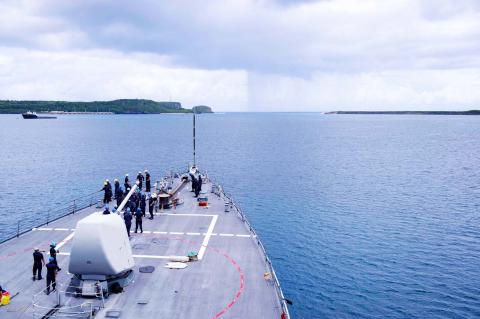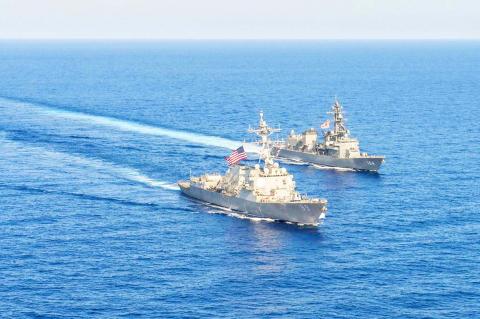Two US guided-missile destroyers, the USS Mustin (DDG-89) and the USS Benfold (DDG-65), transited the Taiwan Strait and Taiwan’s southern exclusive economic zone earlier yesterday on an apparent northeasterly course, the Ministry of National Defense said last night.
The ministry in a news release said that the Republic of China Navy monitored the passage of the two Arleigh Burke-class destroyers in accordance with regulations.
Military personnel remain vigilant and are at their stations, the ministry said, adding that it is confident of its capability to maintain regional stability and protect the nation.

Photo: EPA
The crossing follows a statement by US officials last month that the US was considering sending warships through the Strait.
As far as is known, US Navy ships last crossed the Strait under then-US president George W. Bush in 2007, when the aircraft carrier USS Kitty Hawk and its battle group sailed through the waterway.
The Presidential Office last night said that Taiwan has always valued peace and stability in the Strait and in the region.

Photo: Reuters
As a responsible member of the international community, Taiwan will continue to work to maintain the “status quo” with China and to ensure peace, prosperity and development in the Asia-Pacific region, it said.
The passage of US military vessels through the Strait and the USS Ronald Reagan previously patrolling the South China Sea are strategic preventive actions adopted by the US under its Indo-Pacific strategy, an anonymous source familiar with the matter said.
The purpose is to draw a line to prevent China from damaging the regional “status quo,” as Beijing attempts to challenge it, the source said.
The American Institute in Taiwan was not available for comment as of press time last night.
Additional reporting by Stacy Hsu

The Ministry of the Interior (MOI) is to tighten rules for candidates running for public office, requiring them to declare that they do not hold a Chinese household registration or passport, and that they possess no other foreign citizenship. The requirement was set out in a draft amendment to the Enforcement Rules of the Public Officials Election and Recall Act (公職人員選舉罷免法 ) released by the ministry on Thursday. Under the proposal, candidates would need to make the declaration when submitting their registration forms, which would be published in the official election bulletin. The move follows the removal of several elected officials who were

The Republic of China (ROC) is celebrating its 114th Double Ten National Day today, featuring military parades and a variety of performances and speeches in front of the Presidential Office in Taipei. The Taiwan Taiko Association opened the celebrations with a 100-drummer performance, including young percussionists. As per tradition, an air force Mirage 2000 fighter jet flew over the Presidential Office as a part of the performance. The Honor Guards of the ROC and its marching band also heralded in a military parade. Students from Taichung's Shin Min High School then followed with a colorful performance using floral imagery to represent Taiwan's alternate name

FOUR DESIGNATED AREAS: Notices were issued for live-fire exercises in waters south and northwest of Penghu, northeast of Keelung and west of Kaohsiung, they said The military is planning three major annual exercises across the army, navy and air force this month, with the navy’s “Hai Chiang” (海強, “Sea Strong”) drills running from today through Thursday, the Ministry of National Defense said yesterday. The Hai Chiang exercise, which is to take place in waters surrounding Taiwan, would feature P-3C Orion maritime patrol aircraft and S-70C anti-submarine helicopters, the ministry said, adding that the drills aim to bolster the nation’s offshore defensive capabilities. China has intensified military and psychological pressure against Taiwan, repeatedly sending warplanes and vessels into areas near the nation’s air defense identification zone and across

A Chinese takeover of Taiwan would severely threaten the national security of the US, Japan, the Philippines and other nations, while global economic losses could reach US$10 trillion, National Security Council Deputy Secretary-General Lin Fei-fan (林飛帆) wrote in an article published yesterday in Foreign Affairs. “The future of Taiwan is not merely a regional concern; it is a test of whether the international order can withstand the pressure of authoritarian expansionism,” Lin wrote in the article titled “Taiwan’s Plan for Peace Through Strength — How Investments in Resilience Can Deter Beijing.” Chinese President Xi Jinping’s (習近平) intent to take Taiwan by force